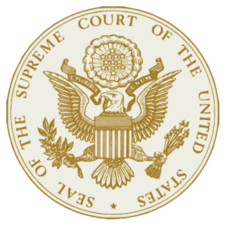Swann v. Charlotte-Mecklenburg Board of Education
 | |
| Swann v. Charlotte-Mecklenburg Board of Education | |
| Reference: 402 U.S. 1 | |
| Term: 1971 | |
| Important Dates | |
| Argued: October 12, 1970 Decided: April 20, 1971 | |
| Outcome | |
| United States Court of Appeals for the Fourth Circuit affirmed | |
| Majority | |
| Warren Burger • Hugo Black • William Douglas • John Harlan II • William Brennan • Potter Stewart • Byron White • Thurgood Marshall • Harry Blackmun | |
Swann v. Charlotte-Mecklenburg Board of Education is a case decided on April 20, 1971, by the United States Supreme Court holding that federal courts can direct public schools to bus students of different races across district lines to integrate schools. The case concerned the Charlotte-Mecklenburg School District in North Carolina, which had not made efforts to integrate its schools after the Supreme Court decision in Brown v. Board of Education in 1954. The Supreme Court affirmed the decision of the United States Court of Appeals for the Fourth Circuit.[1][2][3]
Why it matters: The Supreme Court's decision in this case established that federal courts had the authority to oversee school desegregation in states and propose solutions. To read more about the impact of Swann v. Charlotte-Mecklenburg Board of Education click here.
Background
The Charlotte-Mecklenburg School District in North Carolina did not make efforts to desegregate public schools following the 1954 Supreme Court decision in Brown v. Board of Education. The school district had approximately 14,000 Black students enrolled in public schools that were more than 99% Black. The United States District Court for the Western District of North Carolina ordered the Charlotte-Mecklenburg school board to reassign faculty members and create new attendance zones in an effort to desegregate the schools in the district. The United States Court of Appeals for the Fourth Circuit affirmed the orders of the district court.[1][3]
Oral argument
Oral argument was held on October 12, 1970. The case was decided on April 20, 1971.[1]
Decision
The Supreme Court decided unanimously to affirm the decision of the United States Court of Appeals for the Fourth Circuit. Chief Justice Warren Burger delivered the opinion of the court.[2]
Opinions
Opinion of the court
Chief Justice Warren Burger, writing for the court, argued that federal courts had the authority to use judicial power to seek a solution to state-imposed segregation.[2]
| “ | The objective today remains to eliminate from the public schools all vestiges of state-imposed segregation. Segregation was the evil struck down by Brown I as contrary to the equal protection guarantees of the Constitution. That was the violation sought to be corrected by the remedial measures of Brown II. That was the basis for the holding in Green that school authorities are 'clearly charged with the affirmative duty to take whatever steps might be necessary to convert to a unitary system in which racial discrimination would be eliminated root and branch.'
|
” |
| —Warren Burger, majority opinion in Swann v. Charlotte-Mecklenburg Board of Education[2] | ||
Impact
| Federalism |
|---|
| •Key terms • Court cases •Major arguments • State responses to federal mandates • Federalism by the numbers • Index of articles about federalism |
- See also: Brown v. Board of Education
Swann v. Charlotte-Mecklenburg Board of Education established that federal courts had the authority to intervene regarding the desegregation of schools in the states. The decision in this case also established that schools could bus students of different races across district lines in an effort to integrate public schools.[2]
See also
External links
- Full text of case syllabus and opinions (Justia)
- Supreme Court of the United States
- Search Google News for this topic
Footnotes
- ↑ 1.0 1.1 1.2 Oyez, "Swann v. Charlotte-Mecklenburg Board of Education," accessed September 19, 2022
- ↑ 2.0 2.1 2.2 2.3 2.4 Justia, "Swann v. Charlotte-Mecklenburg Bd. of Educ., 402 U.S. 1 (1971)," accessed September 19, 2022
- ↑ 3.0 3.1 LexisNexis, "Swann v. Charlotte-Mecklenburg Bd. of Educ. - 402 U.S. 1, 91 S. Ct. 1267 (1971)," accessed September 19, 2022
- ↑ Note: This text is quoted verbatim from the original source. Any inconsistencies are attributable to the original source.
| |||||